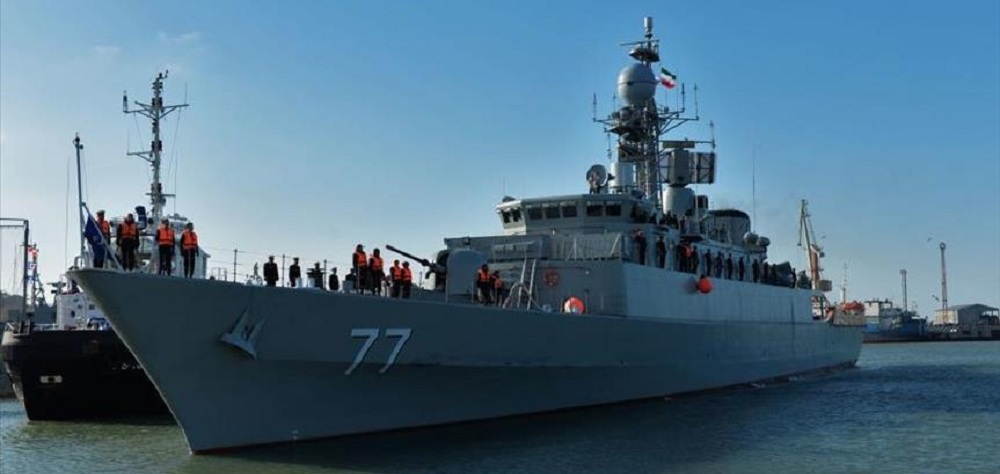Alwaght- While Israeli leaders spare no efforts to prevent Iran from establishing a presence close to the occupied Palestinian territories, their struggles have gone nowhere so far and Tehran is broadening its influence under plans for cross-border strategic power expansion.
Citing satellite images, Israeli officials recently said that four Iranian warships have been patrolling the Red Sea in recent weeks. These remarks were enough to spread fear among the Israelis, with Defense Minister Benny Gantz saying that Iranian military presence in the Red Sea is "most significant" in a decade and claiming it posed threats to world trade, economy, and energy flow. As always, Gantz tried to paint this Iranian practice, which is an ordinary by countries, as a threat to the international community and claimed that Tel Aviv will act in defense of its citizens and interests and is ready to work with partners to establish stability in the region.
The Iranian presence in the Red Sea is motivated by a national security doctrine and defense activities beyond national borders. It has been present in the Red Sea for years to distance foreign threats and defend its national interests. However, as Tehran-Tel Aviv tensions further escalate, the Israeli leaders feel the danger and consider the patrols by Iranian warships a serious threat to them.
Israel is landlocked among Egypt, Jordan, and Syria, and its only connection with the outside world is the Red Sea. It, thus, deems dangerous the military presence of its archenemy Iran in the Red Sea and south of occupied territories. First Israeli Prime Minister David Ben-Gurion in 1949, namely a year after foundation of Israeli regime in occupied Palestine, said: "We are landlocked. The only passage for us to the world and access to continents is sea." These remarks are apparent enough that sea security makes up the artery for Israeli economy the trade of which is all through sea.
The Red Sea is of great strategic importance because it hosts major global transportation routes, including the Suez Canal and the Bab-el-Mandeb Strait. Nearly all of Israeli imports are via sea, and the Red Sea and the Mediterranean Sea are its only routes for trade with the outside world. The Mediterranean is used only for the export of goods to Europe, and part of its exports are done through the Red Sea, and if the security of its ships in this region is endangered, it will face serious problems transferring its goods through the Mediterranean lines. Because in order to transfer goods to Asian and Pacific countries, Tel Aviv has to bypass the African continent and has to pay higher costs and spend a longer time to deliver the shipments.
Therefore, sea security is crucial to Israel and Iran's presence in the Red Sea can make a nightmare for the Israelis. The sailing of Iranian naval vessels in the Red Sea amid heightened Tel Aviv-Tehran tensions and Iranian promise of revenge for assassination of its commanders make things dangerous for the Israelis. They are concerned Iran would target their commercial vessels as part of its revenge plans. This is frightening for Israeli businesspeople who would fear exporting their goods through the Red Sea.
In recent years and after normalization deals with some Persian Gulf Arab monarchies, Israel tried to boost its presence in the Red Sea. On the other hand, Yemen is located on the southern side of the Red Sea and close to Bab-el-Mandeb and after Saudi-led war on Yemen's Ansarullah Movement, the political and military sensitivity of these waters saw an increase. Presence of Iranian warships can disrupt the in-the-making Israeli-Arab bonds, something Tel Aviv officials greatly afraid of. Ansarullah's dominance over Bab-el-Mandeb, in Israeli viewpoint, means increasing Iran's clout in the Red Sea and can pose growing risks to Israeli security.
As part of its normalization agenda, Israel is pursuing boost to its geopolitical position in the region and in relations with Persian Gulf Arab states. Red Sea and Bab-el-Mandeb security play a crucial role in realization of this agenda. Through decades of isolation, Israel hand no trade interactions with any Muslim states and was worried to imagine Arab dominance of straits which could yield navigation restrictions. However, with measures it took over the past years, it managed to export part of goods through the Red Sea. To ensure safety of its ships in the Red Sea and Bab-el-Mandeb, Israel set up air bases near the strategic strait.
According to a report by Israel's Central Bureau of Statistics, the value of the sea trade with Asia and Pacific in 2017 was about $15 billion, most of which Israeli exports. These figures show that the Red Sea is a major transit way for Israeli products. Israel's total trade volume in 2017 amounted to $130 billion, of which the import share was $69 billion and the export share $61 billion. Accordingly, 18 percent of Israel's total imports and 5 percent of its total exports depend on the Bab-el-Mandeb. The significance of Bab-el-Mandeb can be well seen in remarks by Tel Aviv leaders. Ex-PM Benjamin Netanyahu claimed in 2017 that if Iran tries to close the Bab-el-Mandeb strait, Tel Aviv will join an international coalition against Tehran. Since the strait links Red Sea to the Indian Ocean, it is of special importance to Tel Aviv, and the strong presence of Iran and Ansarullah in it can cause many problems for passing Israeli ships.
While Tel Aviv strives to form an anti-Iranian coalition in association with Arab states to push Iran and Axis of Resistance to the corner, Tehran with its powerful military presence just next door sends a message to Tel Aviv, telling it the Islamic Republic is closely watching its moves and if it makes a mistake, it should expect severe consequences.



























